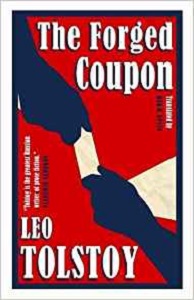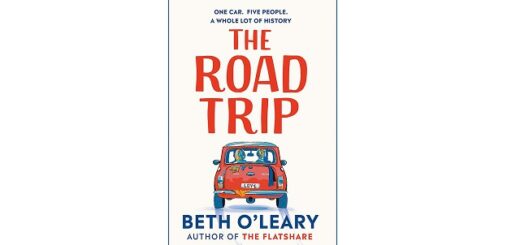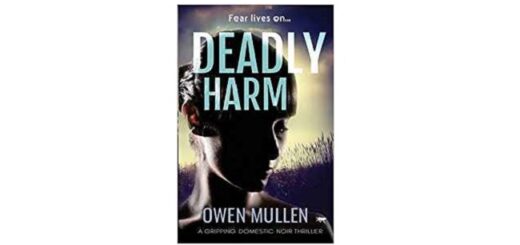The Forged Coupon by Leo Tolstoy – Book Review
The Forged Coupon by Leo Tolstoy – Book Review
The Forged Coupon
Author – Leo Tolstoy
Publisher – Alma Classics
Pages – 128
Released – 22nd February 2018 (re-published)
ISBN-13 – 978-1847496676
Format – ebook, paperback
Reviewer – Clive
Rating – 4 Stars
I received a free copy of this book
Post contains affiliate links.
In order to repay a small debt, the young student Mitya is persuaded by a friend to falsify a bank bond and cash it in. Little does he suspect that this small misdemeanour will have a profound impact on the lives of many other people around him – indirectly even leading to the gravest of crimes.
This in turn sets off a long journey towards redemption and rehabilitation. Published only in 1911, after Tolstoy’s death, The Forged Coupon examines the deep, unpredictable consequences of every human act, revealing the Russian master’s moral preoccupations in the last years of his life, as well as his rejection of Christianity’s simplistic division between good and evil.

We all know that at some stage in our lives we should read War and Peace and Anna Karenina but do we all have the time and commitment to cope with the 1272 and 964 pages that they respectively fill? The Forged Coupon gives us an opportunity to pick up Tolstoy’s attention to detail and his Christian beliefs in a brief novella.
At just seventy nine pages the book can easily be read in two sessions although I am sure that most readers will take advantage of the Introduction and the useful Extra Material sections which Alma Classics always include.
Part 1 of The Forged Coupon moves along at a pace with a succession of linked persons committing ever increasingly serious crimes. This involves numerous characters, all of course with Russian names which do not always read easily. Hugh Aplin’s Introduction tells us that despite its brevity the book was written over a twenty four year period which does not surprise me because Part 2 has a very different feel to it.
The Extra Material section tells us that Tolstoy read a great deal of Western European literature including Charles Dickens and either by design or accident there are similarities. Like Dickens, Tolstoy explores the world of the lower classes and their struggles to make ends meet. The difference is that, harsh though Victorian life was for England’s lower classes, the average Russian peasant suffered far more with considerably fewer rights. Tolstoy also demonstrates how, by design or ignorance, the life of the poor is affected by the actions of the rich and with the benefit of hindsight today’s reader can clearly see how the seeds of the Russian Revolution were being sown even though Tolstoy died eight years before it occurred.
The other Victorian comparison can be seen through Tolstoy’s hope in a style of Christianity based on love, respect and equality rather than the doctrine and regulation issued by the Orthodox, Catholic and Anglican churches of the period. I really enjoyed this aspect of the book.
My other personal pleasure was to read about Bearer Bonds and the accompanying sheets of Coupons which had to be “clipped” and presented to an agent to obtain the dividend or interest payment. Most UK readers will be unfamiliar with these but I was taken back to a long forgotten routine when I worked as a bank securities clerk.
The Forged Coupon may be short but its message packs a punch. I have awarded four stars.
Reviewed by Clive
Purchase online from:
Amazon.co.uk – Amazon.com
About the Author
Count Leo Tolstoy was born in 1828 on the family estate of Yasnaya Polyana, in the Tula province, where he spent most of his early years, together with his several brothers. In 1844 he entered the University of Kazan to read Oriental Languages and later Law, but left before completing a degree. He spent the following years in a round of drinking, gambling and womanising, until weary of his idle existence he joined an artillery regiment in the Caucasus in 1851.
He took part in the Crimean war and after the defence of Sevastopol wrote The Sevastopol Sketches (1855-6), which established his literary reputation. After leaving the army in 1856 Tolstoy spent some time mixing with the literati in St Petersburg before travelling abroad and then settling at Yasnaya Polyana, where he involved himself in the running of peasant schools and the emancipation of the serfs. His marriage to Sofya Andreyevna Behrs in 1862 marked the beginning of a period of contentment centred around family life; they had thirteen children. Tolstoy managed his vast estates, continued his educational projects, cared for his peasants and wrote both his great novels, War and Peace (1869) and Anna Karenina (1877).
During the 1870s he underwent a spiritual crisis, the moral and religious ideas that had always dogged him coming to the fore. A Confession (1879-82) marked an outward change in his life and works; he became an extreme rationalist and moralist, and in a series of pamphlets written after 1880 he rejected church and state, indicted the demands of flesh, and denounced private property. His teachings earned him numerous followers in Russia and abroad, and also led finally to his excommunication by the Russian Holy Synod in 1901. In 1910 at the age of eighty-two he fled from home ‘leaving this worldly life in order to live out my last days in peace and solitude’; dying some days later at the station master’s house at Astapovo.




